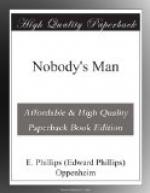“You lost Hellesfield, Mr. Tallente, as you would have lost any seat north of Bedford,” he declared.
“Owing to the influence of the Democrats?”
“Certainly.”
“But why is that influence exercised against me?” Tallente demanded. “I am thankful to have an opportunity of asking you that question, Dartrey. Surely you would reckon me more of a people’s man than these Whigs and Coalitionists?”
“Very much more,” Dartrey agreed. “So much more, Mr. Tallente, that we don’t wish to see you dancing any longer between two stools. We want you in our camp. You are the first man, Tallente, whom we have sought out in this way. We have come at a busy time, under pretext of a holiday, some two hundred miles from London to suggest to you, temporarily deprived of political standing, that you join us.”
“That temporary deprivation,” Tallente murmured, “being due to your efforts.”
“Precisely!”
“And the alternative?”
“Those who are not with us are against us,” Dartrey declared. “If you persist in remaining the doubtful factor in politics, it is our business to see that you have no definite status there.”
Tallente laughed a little cynically.
“Your methods are at least modern,” he observed. “You invite a man to join your party, and if he refuses you threaten him with political extinction.”
“Why not?” Dartrey asked wonderingly. “You do not pause to consider the matter. Government is meant for the million. Where the individual might impede good government, common sense calls for his ostracism. No nation has been more slow to realise this than England. A code of order and morals established two thousand years ago has been accepted by them as incapable of modification or improvement. To take a single instance. Supposing De Valera had been shot the first day he talked treason against the Empire, your troubles with Ireland would have been immensely minimised. And mark this, for it is the crux of the whole matter, the people of Ireland would have attained what they wanted much sooner. You are not one of those, Andrew Tallente, who refuse to see the writing on the wall. You know that in one form or another in this country the democracy must rule. They felt the flame of inspiration when war came and they helped to win the war. What was their reward? The opulent portion of them were saddled with an enormous income tax and high prices of living through bad legislation, which made life a burden. The more poverty-stricken suffered sympathetically in exactly the same way. We won the war and we lost the peace. We fastened upon the shoulders of the deserving, the wage-earning portion of the community, a burden which their shoulders could never carry a burden which, had we lost the war instead of winning it, would have led promptly to a revolution and a measure at least of freedom.”
“There is so much of truth in what you say,” Tallente declared, “that I am going to speak to you frankly, even though my frankness seems brutal. I am going to speak about your friend Miller here. Throughout the war, Miller was a pacifist. He was dead against killing Germans. He was all for a peace at any price.”




